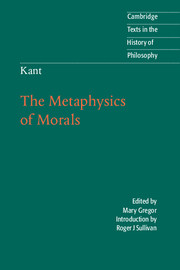I - Private right
from Part I - Metaphysical first principles of the doctrine of right
Summary
How to Have Something External as One’s Own
That is rightfully mine (meum iuris) with which I am so connected that another's use of it without my consent would wrong me. The subjective condition of any possible use is possession.
But something external would be mine only if I may assume that I could be wronged by another's use of a thing even though I am not in possession of it. – So it would be self-contradictory to say that I have something external as my own if the concept of possession could not have different meanings, namely sensible possession and intelligible possession, and by the former could be understood physical possession but by the latter a merely rightful possession of the same object.
But the expression “an object is external to me” can mean either that it is an object merely distinct from me (the subject) or else that it is also to be found in another location (positus) in space or time. Only if it is taken in the first sense can possession be thought of as rational possession; if taken in the second sense it would have to be called empirical possession. – Intelligible possession (if this is possible) is possession of an object without holding it (detentio).
Whoever wants to assert that he has a thing as his own must be in possession of an object, since otherwise he could not be wronged by another's use of it without his consent. For if something outside this object which is not connected with it by rights affects it, it would not be able to affect himself (the subject) and do him any wrong.
- Type
- Chapter
- Information
- Kant: The Metaphysics of Morals , pp. 35 - 86Publisher: Cambridge University PressPrint publication year: 1996

